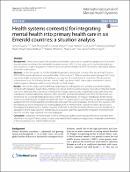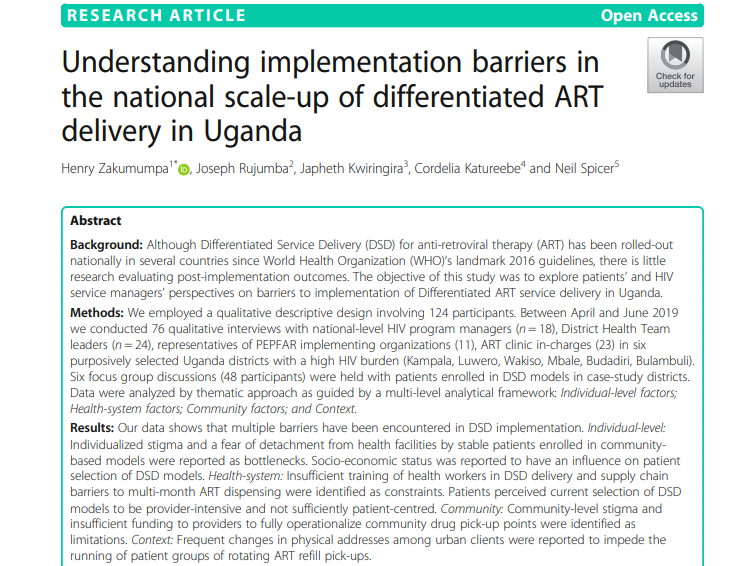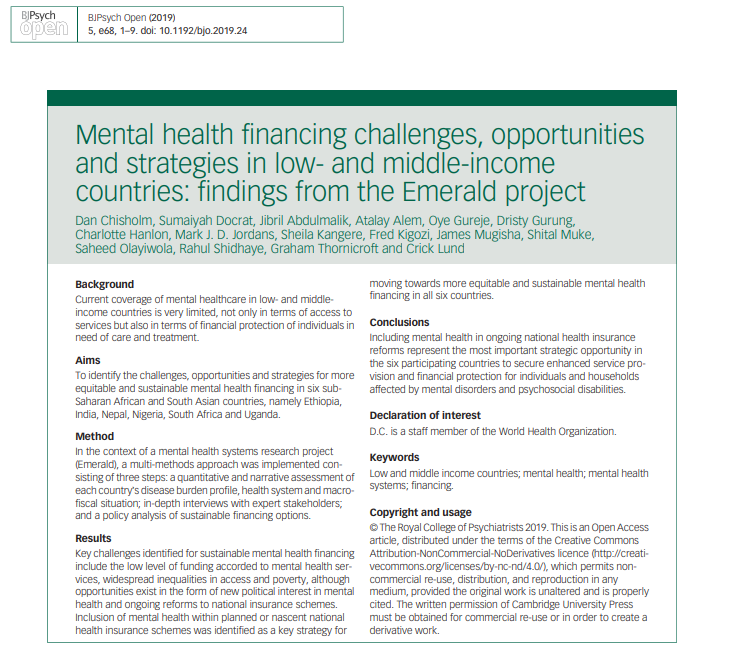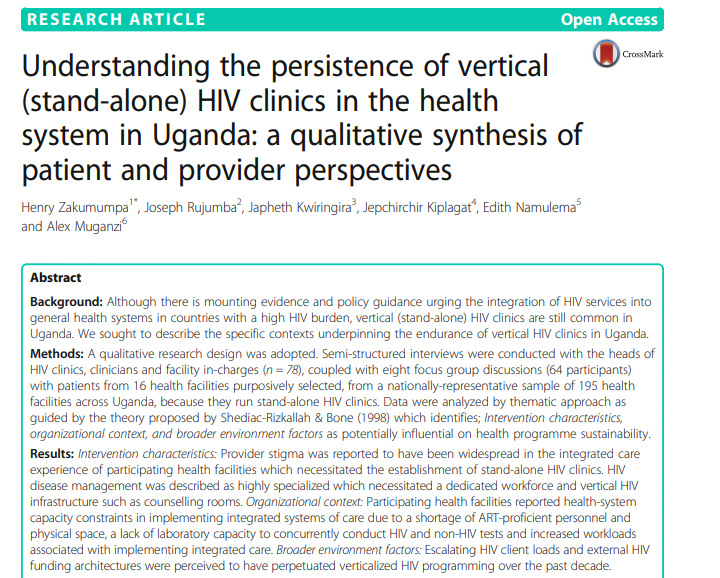Health systems context(s) for integrating mental health into primary health care in six Emerald countries: a situation analysis

View/
Date
2017-01-05Author
Mugisha, James
Abdulmalik, Jibril
Hanlon, Charlotte
Petersen, Inge
Lund, Crick
Upadhaya, Nawaraj
Ahuja, Shalini
Shidhaye, Rahul
Mntambo, Ntokozo
Alem, Atalay
Gureje, Oye
Kigozi, Fred
Metadata
Show full item recordAbstract
Mental, neurological and substance use disorders contribute to a significant proportion of the world’s
disease burden, including in low and middle income countries (LMICs). In this study, we focused on the health systems
required to support integration of mental health into primary health care (PHC) in Ethiopia, India, Nepal, Nigeria,
South Africa and Uganda.
Methods: A checklist guided by the World Health Organization Assessment Instrument for Mental Health Systems
(WHO-AIMS) was developed and was used for data collection in each of the six countries participating in the Emerging
mental health systems in low and middle-income countries (Emerald) research consortium. The documents
reviewed were from the following domains: mental health legislation, health policies/plans and relevant country
health programs. Data were analyzed using thematic content analysis.
Results: Three of the study countries (Ethiopia, Nepal, Nigeria, and Uganda) were working towards developing
mental health legislation. South Africa and India were ahead of other countries, having enacted recent Mental Health
Care Act in 2004 and 2016, respectively. Among all the 6 study countries, only Nepal, Nigeria and South Africa had
a standalone mental health policy. However, other countries had related health policies where mental health was
mentioned. The lack of fully fledged policies is likely to limit opportunities for resource mobilization for the mental
health sector and efforts to integrate mental health into PHC. Most countries were found to be allocating inadequate
budgets from the health budget for mental health, with South Africa (5%) and Nepal (0.17%) were the countries with
the highest and lowest proportions of health budgets spent on mental health, respectively. Other vital resources
that support integration such as human resources and health facilities for mental health services were found to be in
adequate in all the study countries. Monitoring and evaluation systems to support the integration of mental health
into PHC in all the study countries were also inadequate.
Conclusion: Integration of mental health into PHC will require addressing the resource limitations that have been
identified in this study. There is a need for up to date mental health legislation and policies to engender commitment
in allocating resources to mental health services.
Collections
Related items
Showing items related by title, author, creator and subject.
-
Understanding implementation barriers in the national scale-up of differentiated ART delivery in Uganda
Zakumumpa, Henry; Rujumba, Joseph; Kwiringira, Japheth; Katureebe, Cordelia; Spicer, Neil (Springer nature: BMC Health Services Research., 2020-03-17)Although Differentiated Service Delivery (DSD) for anti-retroviral therapy (ART) has been rolled-out nationally in several countries since World Health Organization (WHO)‘s landmark 2016 guidelines, there is little research ... -
Mental health financing challenges, opportunities and strategies in low- and middle-income countries: findings from the Emerald project
Chisholm, Dan; Docrat, Sumaiyah; Abdulmalik, Jibril; Alem, Atalay; Gureje, Oye; Gurung, Dristy; Hanlon, Charlotte; Jordans, Mark J. D.; Kangere, Sheila; Kigozi, Fred; Mugisha, James; Muke, Shital; Olayiwola, Saheed; Shidhaye, Rahul; Thornicroft, Graham; Lund, Crick (Cambridge University Press., 2019-08-06)Current coverage of mental healthcare in low- and middle-income countries is very limited, not only in terms of access to services but also in terms of financial protection of individuals in need of care and treatment. Aims To ... -
Understanding the persistence of vertical (stand-alone) HIV clinics in the health system in Uganda: a qualitative synthesis of patient and provider perspectives
Zakumumpa, Henry; Rujumba, Joseph; Kwiringira, Japheth; Kiplagat, Jepchirchir; Namulema, Edith; Muganzi, Alex (Springer nature: BMC Health Services Research., 2018-09-05)Although there is mounting evidence and policy guidance urging the integration of HIV services into general health systems in countries with a high HIV burden, vertical (stand-alone) HIV clinics are still common in Uganda. ...



